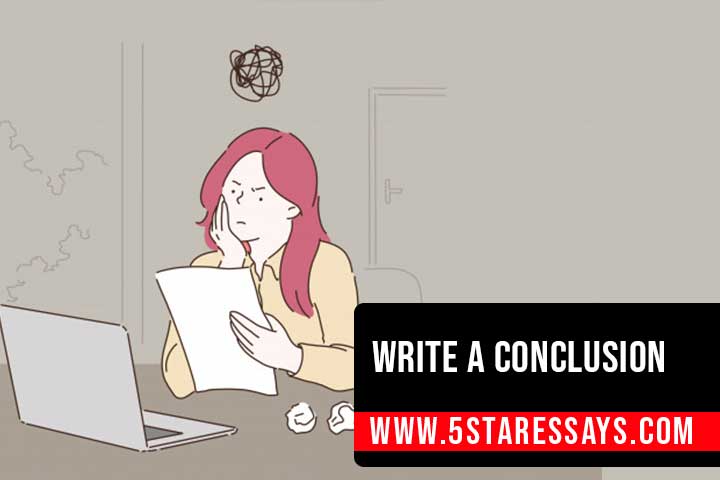LEARN HOW TO WRITE A CONCLUSION STEP BY STEP
LEARN HOW TO WRITE A CONCLUSION STEP BY STEP

Wondering why you get a poor grade on your essay even after putting in a lot of effort?
Well, it could be because you don’t know how to write a conclusion properly.
Most students are in such a hurry to finish writing their paper that they often don’t pay attention to the last paragraph and conclude it abruptly. What they fail to realize is that essay writing isn’t just about the body paragraphs. The conclusion holds the same importance as the introduction or other parts of essays.
Since it is the last thing that you leave the reader with, you must make sure that it is worth remembering.
To help you overcome this problem, we have discussed the actual conclusion definition, conclusion examples and the outline for the conclusion paragraph.
1. What is a Conclusion?
Think of it this way – a concluding paragraph helps the person reading your paper go back to their real-life. Just how the introduction helps them transition into the world that you have made up with your writing.
A conclusion is the final paragraph of your essay, research paper, or any other piece of writing. With this paragraph, you sum up the important points of the essay and restate your thesis statement. This gives the readers a sense of closure and gives the writer a last chance to persuade the audience to agree with his/her point of view.
The goal is to close off the essay by giving the reader a sense of competition, along with giving them some to think about or a call to action. The impression that you make in the essay conclusion stays with the reader, so use this chance wisely and remind them of the importance of your topic and why it matters.
2. How to Write a Conclusion Paragraph?
When writing the concluding paragraph, you must think of the final point that you want to share with the reader and leave them with something to ponder over. Since it wraps up the paper and shows the reader what you have accomplished with your essay, it is essential that you
Here are some things that you must consider in order to start a conclusion:
You can take help from the introductory paragraph to conclude an essay. If your introduction is up to the mark, then you can rewrite it after tweaking it a little and use it as the conclusion. Your essay should be like a full circle; you must end where you started from.
Link the ending to your introduction, restating a keyword or phrase. It is important to learn how to start an essay effectively in order to keep your readers hooked into your writing.
If you've written your essay on a complex topic, with more than three body paragraphs where you've explained different points, it's useful to go through all of them again to get a better idea. Take out the crux of each paragraph and rewrite it in the concluding paragraph. The concluding paragraph gives you a chance of highlighting the importance of the issue at hand if you've mentioned the different causes of obesity in your essay, your concluding sentence should sum up these reasons.
To leave a strong impact with your essay, give the reader something to think about even after they're done reading. Suggest some course of action, encourage them to think deeper about the issue or do something about it.
It all depends on your conclusion sentence and how you choose to write it. For example, you can end by saying “There is a lot that can be done to fight obesity. Start by downloading an app and count your calories.”
3. Concluding Paragraph Outline
Follow these steps in order to write an interesting conclusion.
Topic Sentence
There are different ways to start a conclusion; however, the most effective approach is to rephrasing the thesis statement. Make sure that you aren't repeating it word by word; it should have the same idea but different wording as compared to the introduction.
Supporting Sentences
In this part, you wrap up the main arguments and points made in the body of the essay. Try to demonstrate the relationship between them and how everything fits together.
Closing Statement
Your final words can be anything from a quotation, a course of action, some provocative insight, encouragement for further study. Make sure to connect it back to the introduction, giving a sense of completion.
4. Conclusion Examples
Here are some examples of the different types of conclusions that you can use depending on the type of paper you are going for. Don't copy them as it is, use them to increase your understanding then mould them according to your requirements.

CONCLUSION EXAMPLEView File
4.1 Conclusion Strategies: The Do's and Don'ts
Do's
Ask yourself “So what?” So what if this happens? Why difference does it make? Why should anyone care about this? And then using the answers, try to conclude the essay.
Link back to the themes discussed in the introduction.
Summarize the main points without repeating them.
Propose a course of action.
Don'ts
Do not introduce any new information at this stage.
Don't point out every single detail shared in the body.
If your essay isn't in the first-person, don't end with your personal thoughts.
Avoid using sentences such as “I'm no expert, but this is my opinion…”
Don't start with phrases such as “To conclude, to sum it up, in conclusion…”
Don't share any evidence in this section that should've been stated in the body.
A strong concluding paragraph is an integral part of your essay, it helps make sense of the entire paper.
Our Advantages
Quality Work
Unlimited Revisions
Affordable Pricing
24/7 Support
Fast Delivery